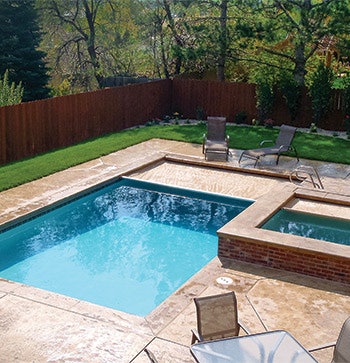{bglink 4626}Ok, maybe that's a little aggressive. But in times when the laws requiring fenced-in pools are starting to change and water conservation is especially topical (especially in areas of extreme drought), the case for automatic pool covers has never been stronger. The technology is quickly evolving and the features available today make these products much more cost effective than in the past. All this adds up to a more intuitive, longer lasting and highly sought-after piece of pool equipment. If you still aren't convinced, keep reading and we'll tell you everything you need to know to be knowledgeable and informed about automatic pool covers.
The Benefits of Automatic Pool Covers
Automatic pool covers satisfy one of the biggest concerns that potential pool owners havte: safety. Many areas of the country currently require pool owners to build a fence around their pool to ensure the safety of children and neighbors. However, some municipalities are amending the rules, stating that automatic pool covers satisfy the barrier requirement under the law. Whether required by law or not, when it comes to a child's safety, utilizing an automatic pool cover or fence are equally effective options. However, many would agree that pool covers are the more aesthetically pleasing option — but we'll let the pool owners make the final call on that.
RELATED: The Case for Automatic Pool Covers
The second concern to many potential pool owners is water conservation, especially for those who live in California, Texas, Utah, New Mexico, Nevada and Arizona. Costs and potential penalties that stem from refilling a pool every time the water level dips have increased exponentially over the past year. One of the easiest ways to combat this is through an automatic pool cover.
 A recent study found an automatic pool cover can save up to 94 percent of a pool's water loss, making them a great fit for pools in drought-stricken areas.
A recent study found an automatic pool cover can save up to 94 percent of a pool's water loss, making them a great fit for pools in drought-stricken areas.
One study showed that a 20-by-40-foot pool evaporating at 1 inch per week loses 26,000 gallons of water each year. With a pool cover, it only loses 2,600 gallons per year, saving 23,400 gallons of water annually.
A recent study by Cal Poly found an automatic pool cover can save up to 94 percent of a pool's water loss. That's a lot of water to be saved (especially when water saved = money saved + environment cared for).
Where the Automatic Pool Cover Industry is Headed
Pool covers contribute to pool safety and water conservation. There may be a good number of people out there reading this article saying, "Yes, we already know this." Which is fair, because this isn't necessarily new for the pool cover industry. So what is?
 Automatic pool covers are making great strides in recent years with stainless steel cables, corrosion-resistant parts and automation features.
Automatic pool covers are making great strides in recent years with stainless steel cables, corrosion-resistant parts and automation features.
Cable instead of rope: Stainless steel cables are game changers in the pool cover industry. Traditional ropes require realignment, stretch out over time and can even break, requiring owners to conduct regular maintenance to ensure proper functionality of their cover. With stainless steel cables, though, realignment is virtually eliminated. Stainless steel cables perform better than their rope counterparts and equate to a long-lasting and lower maintenance cover.
RELATED: Slat Covers Rise in Popularity
Corrosion resistance: The moving parts of pool covers used to be susceptible to damage caused by harsh pool chemicals, especially when that pool was using salt-water chlorination. The chemicals would build up on the pool cover mechanisms and cause deterioration and malfunction. Salt-water chlorinated pools no longer present a problem for today's covers, though. The anodization of roller drums, stainless steel end hubs and rope reels have created a stronger, longer lasting product that is resistant to corrosion and has a longer lifespan.
Automation: Pool covers are also benefiting from a wider trend in the pool industry: automation. Pool owners have long been able to electronically control almost every single aspect of the pool's operation: now, the pool cover is connected as well. While having a line of sight to the pool is always required before opening or closing a cover, the pool's equipment can take cues from the cover's operation. Water features can turn off automatically, chlorine generation can be dialed down, and pump cycles lowered when a cover closes. This means lower costs and longer equipment life.
Final Thoughts
Automatic pool covers provide financial, environmental and safety benefits. The return on investment is immediate: heating costs are cut as covers hold warm water inside a pool, owners don't spend as much money on water and chemicals because evaporation is inhibited, stainless steel cables and anodized mechanisms keep equipment maintenance to a minimum and the life of pool equipment is extended as covers keep clogging debris out of pools. Automatic pool covers are easy to use, keep pool equipment functioning efficiently, contribute to conservation efforts and keep children safer. They have evolved and now the perfect time to cash in on their many benefits.
Comments or thoughts on this article? Please e-mail [email protected].
Todd Cramer is president of Cover-Pools Incorporated, an automatic pool cover manufacturer based in Salt Lake City.











































